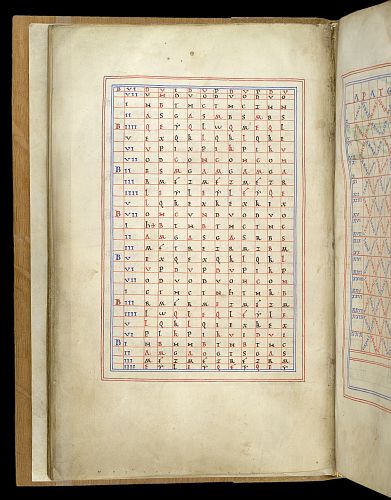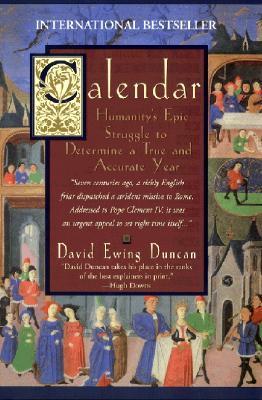 Day to day, our time is marked by weeks, months and years. We take it for granted that no matter where you are
on earth, you always know where you are in time.
Day to day, our time is marked by weeks, months and years. We take it for granted that no matter where you are
on earth, you always know where you are in time.The calendar is such a routine concept that it takes a book like David Ewing Duncan's excellent and most engaging Calendar to make you stop and think.
A 7-day week is completely arbitrary for instance, apparently originating circa 700 BC in Babylon, and probably influenced by the seven known planets (at the time).
Months are confusion personified. Inspired by the lunar cycle, one is left with the dilemma of trying to fit the cycles within the solar year. The chart below (produced with the open source lcap program) is probably the easiest way to see how the lunar months drift in relation to the solar year. Some, like the Greek astronomer Metron, attempt to rationalise the relationship with great precision (the 19-year Metronic cycle has 7 years of 13 lunar months followed by 12 years of 12 lunar months. Even that is not completely accurate). To most calendarists however, months scarcely retained a notional relationship to the moon, becoming little more than convenient units of time upon which to hang the names of Gods and Emperors.
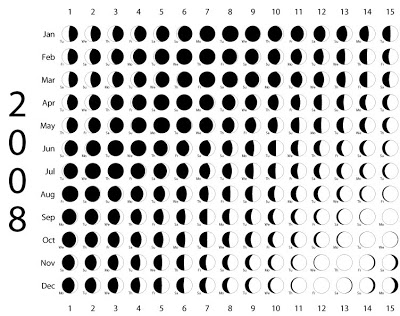
NB: the difficulty in tracking the moon also came up in relation to the challenge of measuring longitude. Accurate moon charts would have allowed mariners to determine their position even in the absence of accurate time-keeping devices. Predicting the moon's course in the end proved to be much more challenging than building a clock that could survive a nautical adventure and still keep good time. See Dava Sobel's Longitude.
The idea of the solar year - the complete cycle of the seasons from one solstice to the next - is fundamental to how we conceive the passage of time. But we don't often think about the difference between a sidereal year (time for the earth to complete one complete orbit of the sun), and the tropical year (time from one vernal [spring/March] equinox to the next). Or the fact that the year is so very slightly different if you measure between the June or December solstices or the September equinox. And then consider that the Earth is a huge object hurtling through space and subject to varying gravitational forces and other bumps and jitters.
Once you have boiled all this down, it seems a "day" is about the only fundamental unit of calendar time that makes sense. Everything else is just convention and approximation!
Considering the difficulty of measurement, and the many social, political and religious factors involved in common convention, it is quite extra-ordinary that we even have a universally accepted calendar today.
It is easy to forget just how recent a phenomenon this is, and how long its introduction was in the making.
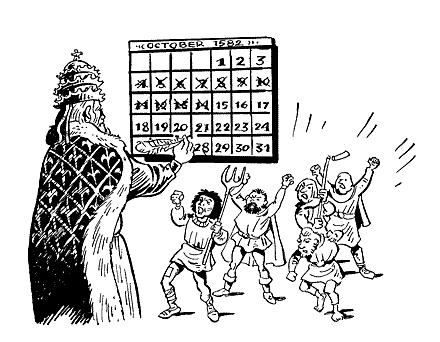 The Gregorian calendar we use today was officially launched by Pope
Gregory in 1582, but it wasn't introduced in Britain until 1752 with many countries not adopting it until the 20th
century (for example, Russia in 1918 and Greece in 1924). Many quote Mao Zedong declaration of the People's Republic of
China in October 1949, which included a point on the adoption of the Gregorian calendar, as the final triumph for a
universal calendar (although many cultures still maintain parallel systems such as the Chinese lunar calendar). But do
not forget that the flaws in Julius Ceasar's previous calendar had been know long before - the cause of much
consternation at the Council at Nicaea in AD325 over the scheduling of Easter, and the subject of the monk Roger
Bacon's must distressed entreaty to Pope Clement in 1266 to:
The Gregorian calendar we use today was officially launched by Pope
Gregory in 1582, but it wasn't introduced in Britain until 1752 with many countries not adopting it until the 20th
century (for example, Russia in 1918 and Greece in 1924). Many quote Mao Zedong declaration of the People's Republic of
China in October 1949, which included a point on the adoption of the Gregorian calendar, as the final triumph for a
universal calendar (although many cultures still maintain parallel systems such as the Chinese lunar calendar). But do
not forget that the flaws in Julius Ceasar's previous calendar had been know long before - the cause of much
consternation at the Council at Nicaea in AD325 over the scheduling of Easter, and the subject of the monk Roger
Bacon's must distressed entreaty to Pope Clement in 1266 to:.. apply excellent remedies in this particular .. If then this glorious work should be performed in your Holiness' time, one of the greatest, best, and finest things ever attempted in the Church of God would be consummated.
All of this is of course the background to an epic tale that finds a thread through all peoples over all time.
Which is really the genius of David Duncan's work. He is a great explainer, and in telling the story of the calendar, he tells the story of much of human civilization. And where other "histories of the world" tend to struggle to fit a narrative thread across time and place, the story of the calendar provides Duncan with a perfect segue. The result is the most enjoyable, understandable and effective history lesson I have ever had.
If you have just the slightest interest in history or how the calendar came about as we know it, I couldn't recommend this book more highly.
Other interesting facts:
-
- In Britain, New Years Day was celebrated on March 25, the Feast of the Assumption, until it was changed to January 1 in 1752. There are over 30 definitions of New Year listed on wikipedia.
-
- Until the modern era of atomic clocks, the most accurate measurement of the year was by Abu Allah Mohammed Ibn Jabir al-Battani in AD 882 (22 seconds short). al-Battani's work came from the same period of Arab innovation that produced modern algebra and added "zero" to the nine Indian symbols that eventually became our familiar number system.
-
Calendar for December from a French Book of Hours, written around 1470:
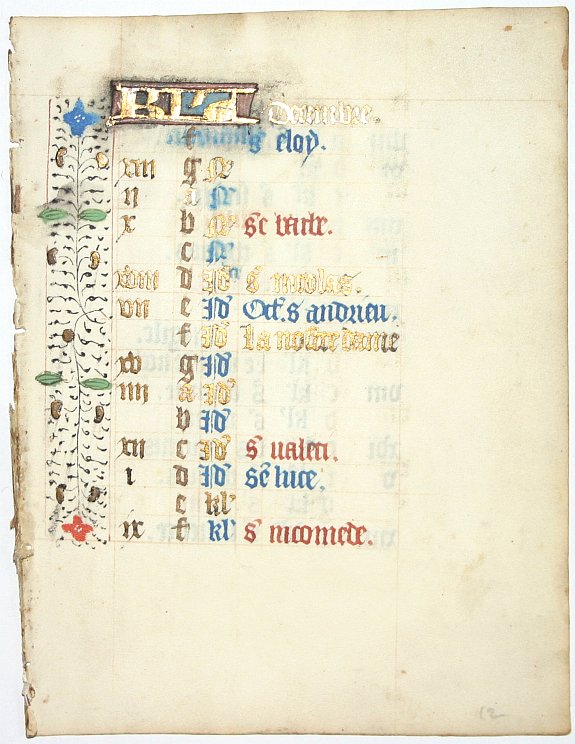
Easter table, England, 1073:
